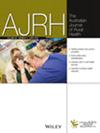Integrating Lived and Clinical Perspectives to Advance Transgender Healthcare in Rural Aotearoa New Zealand
Abstract
Objective
This study aimed to explore healthcare experiences of transgender and gender diverse (TGD) individuals, their whānau (family), and primary care clinicians in rural Aotearoa New Zealand. It explored the enablers of gender-affirming care (GAC) and the challenges that remain, using these insights to build a culturally responsive, strengths-based model of care.
Design
Qualitative study using semi-structured interviews, analyzed via reflexive thematic analysis.
Setting
Whanganui, a regional district in Aotearoa New Zealand.
Participants
Participants included 12 TGD individuals, two whānau members, and five clinicians providing GAC within primary care.
Main Outcome Measures
Experiences of accessing and delivering healthcare, with a focus on GAC pathways, mental health support, and culturally appropriate service models.
Results
TGD participants described fragmented systems requiring self-navigation, with delays, gatekeeping, and limited access to affirming mental health services. Clinicians reported gaps in training, a lack of clear pathways, and few referral options. Both groups emphasized the value of peer support, whānau-centered models, and culturally safe approaches. There was shared support for a local, centralized GAC service in Whanganui, building on existing resources and grounded in cross-sector collaboration, clinician education, and local leadership.
Conclusion
This study demonstrates both the challenges and potential of rural TGD healthcare. Findings support a regionally tailored model of GAC involving services and community, sustained through partnership and grounded in cultural safety. In Whanganui, strong foundations already exist to support such a model. With local adaptation, it could guide equitable service development in other rural regions of Aotearoa.

 求助内容:
求助内容: 应助结果提醒方式:
应助结果提醒方式:


